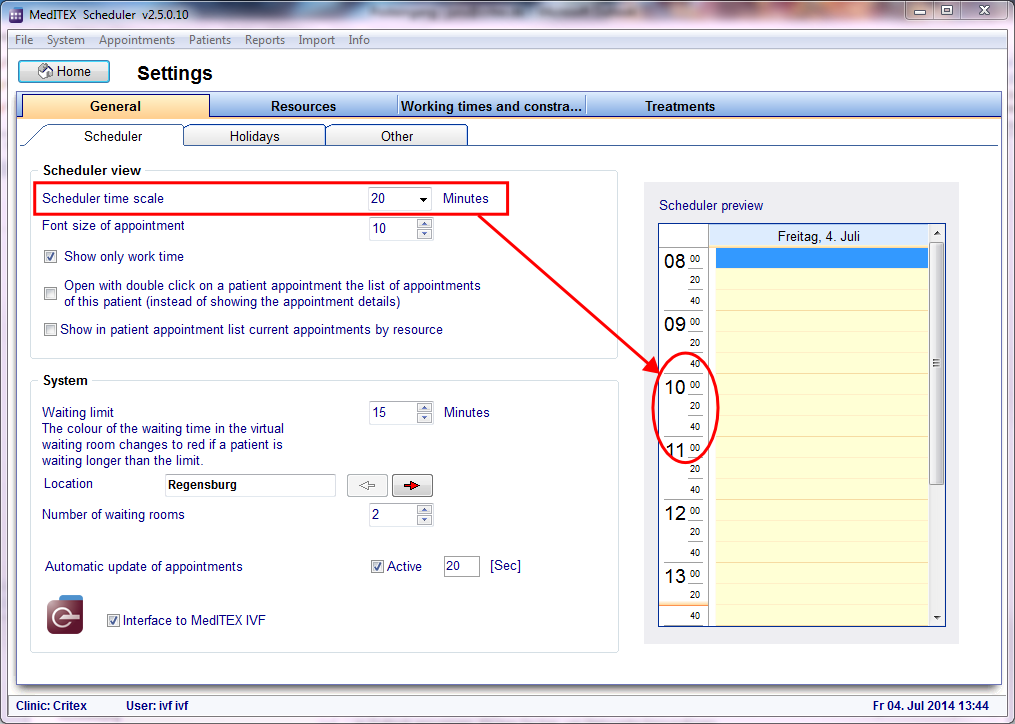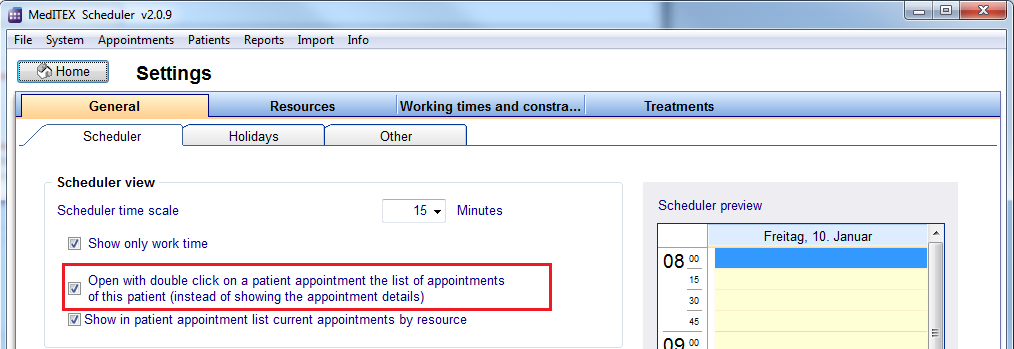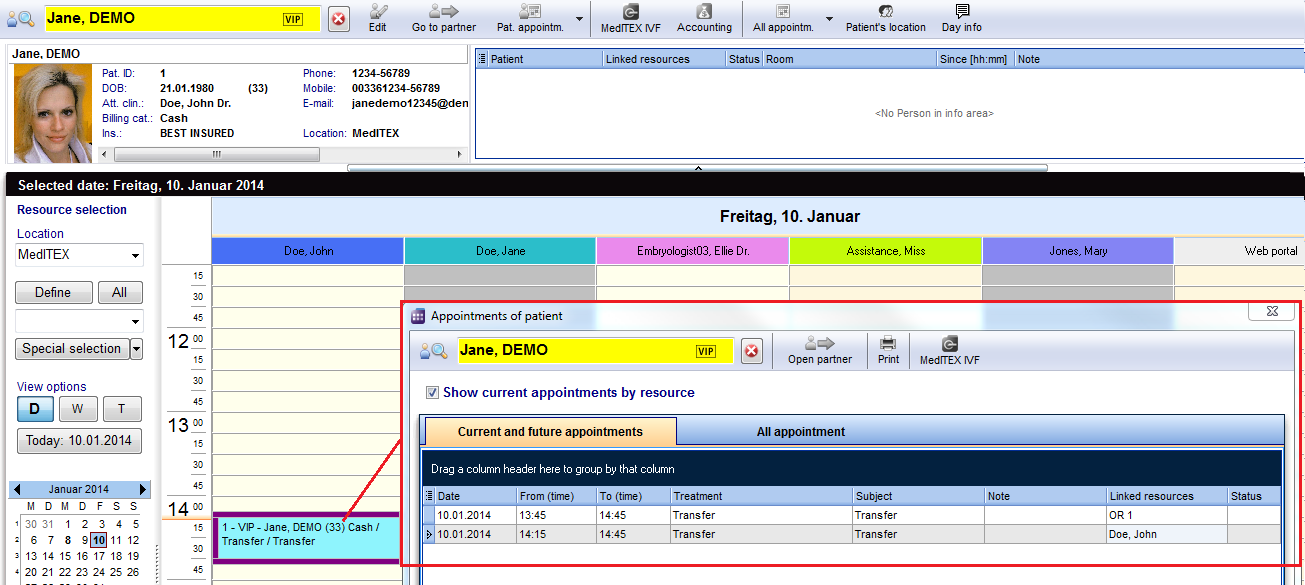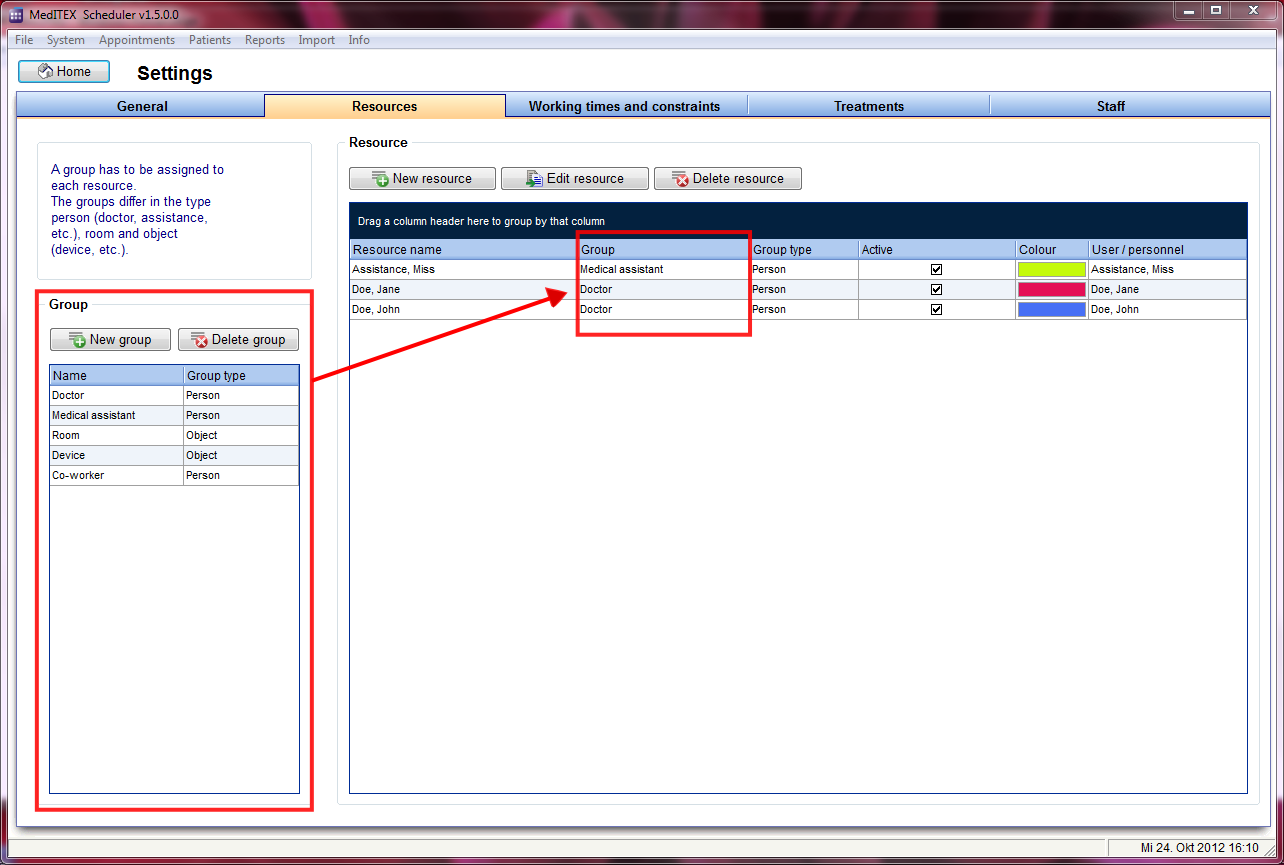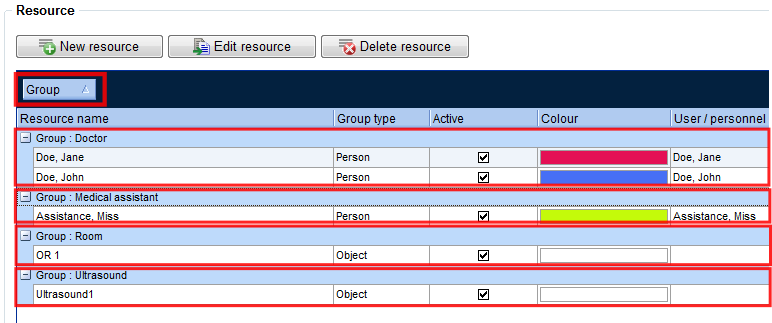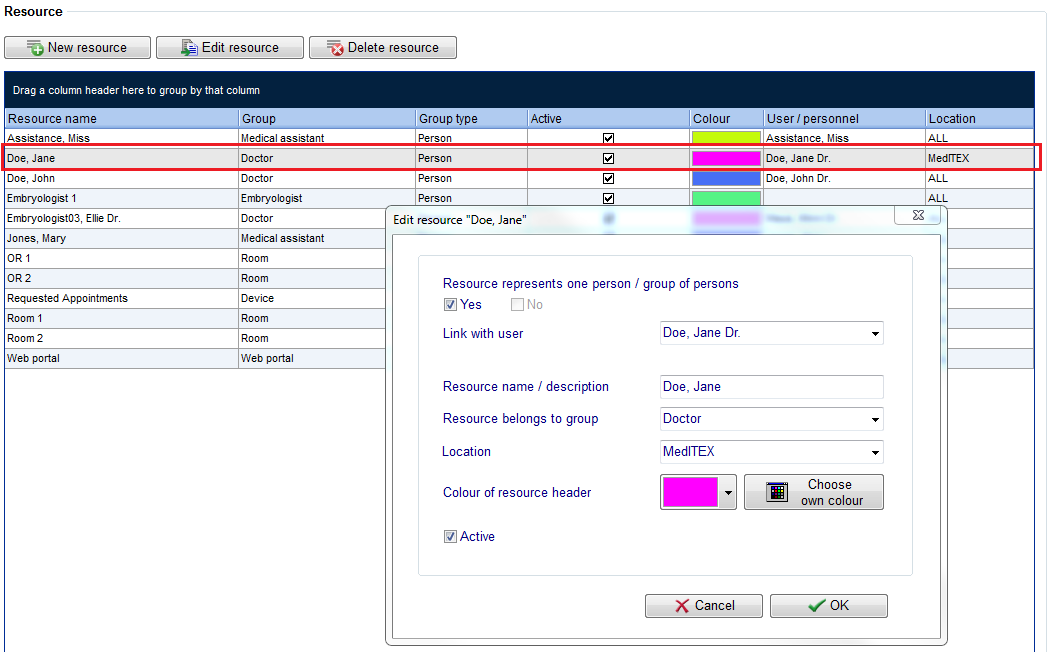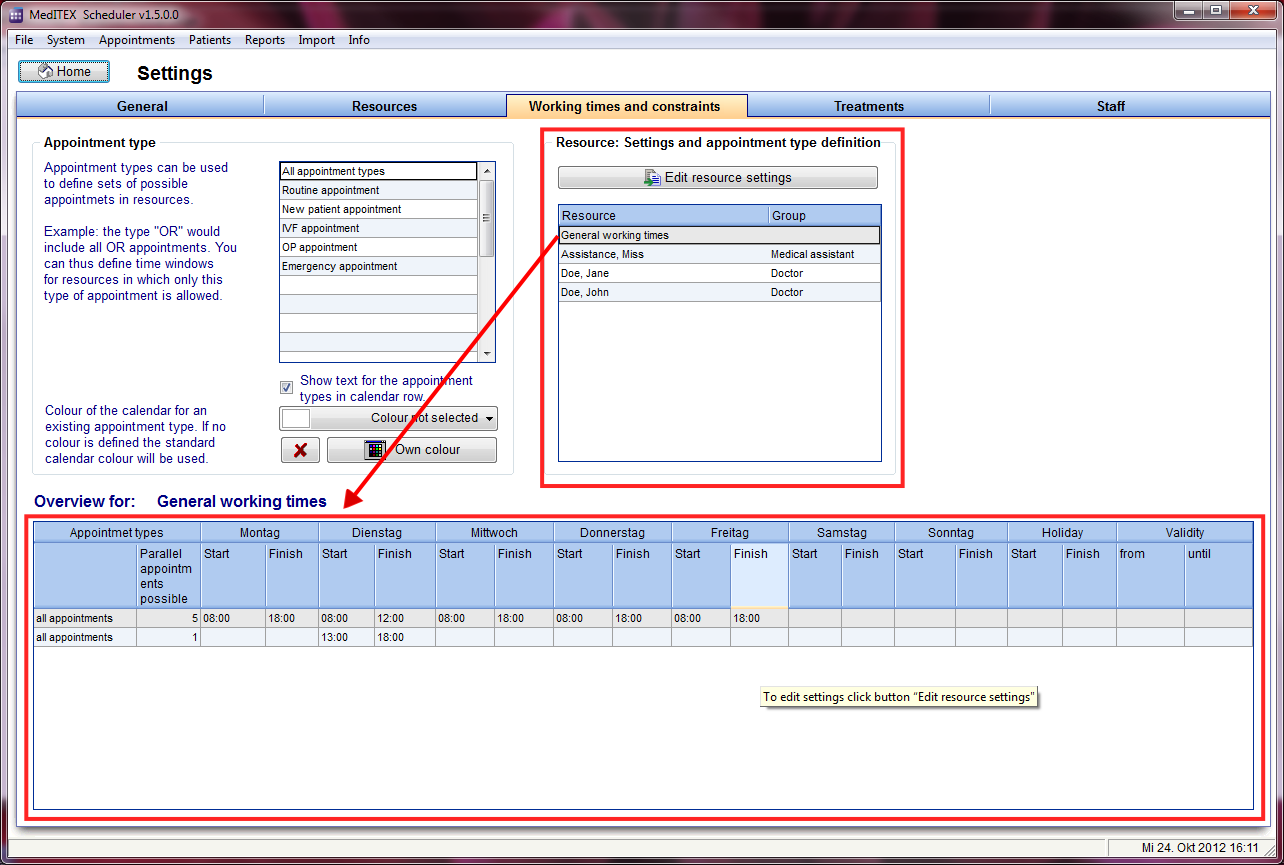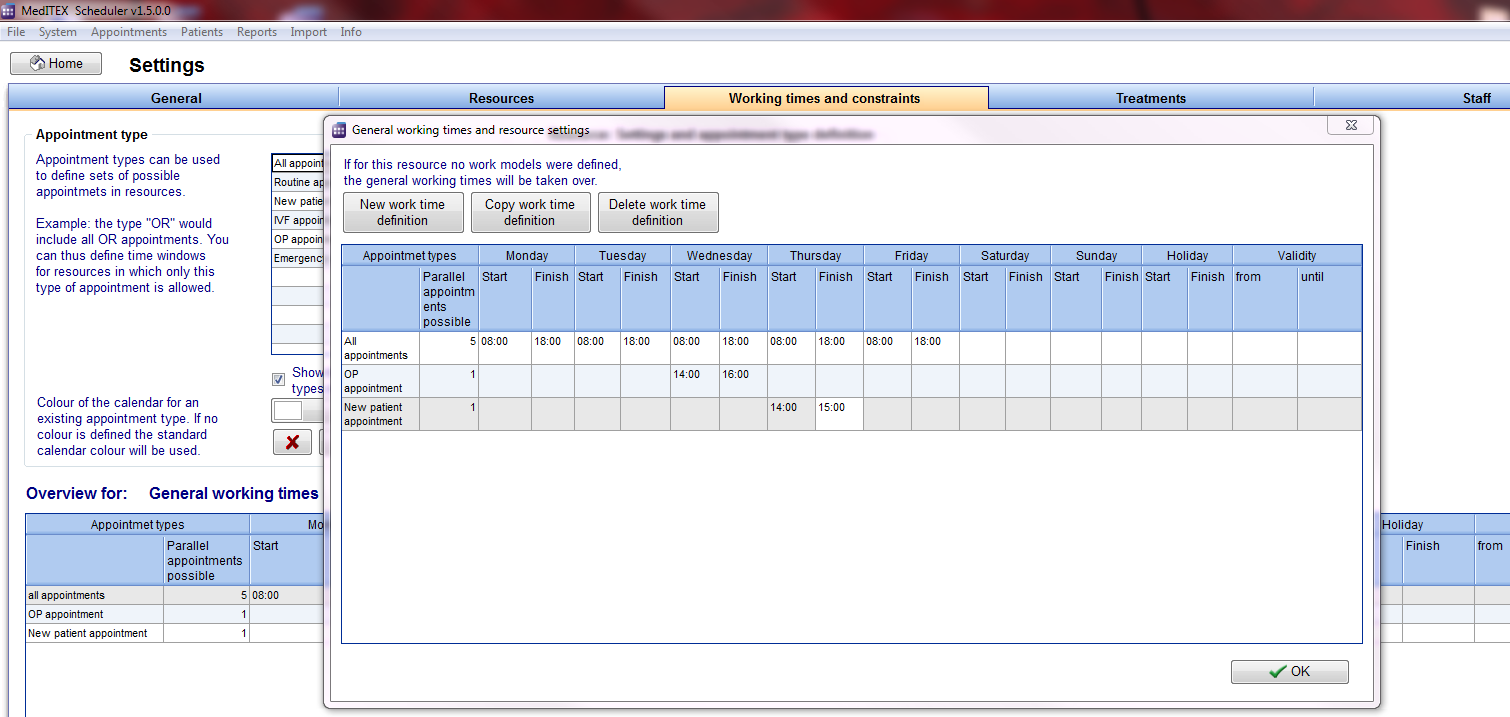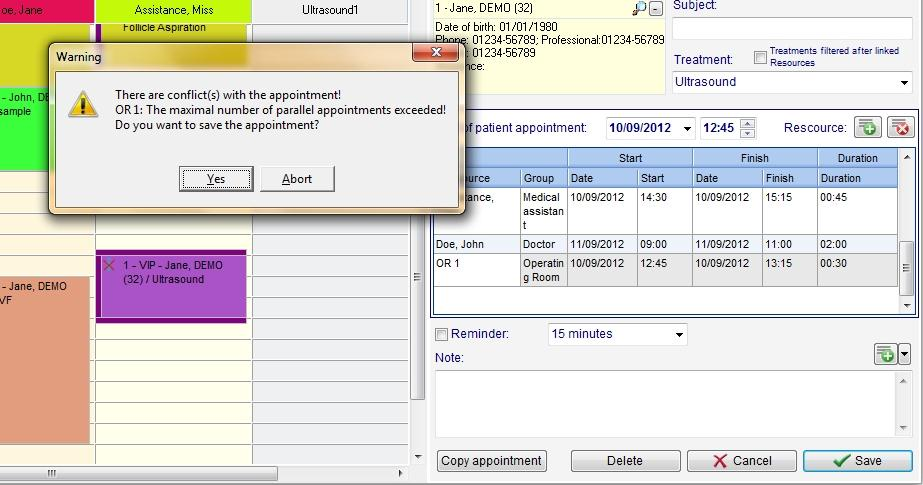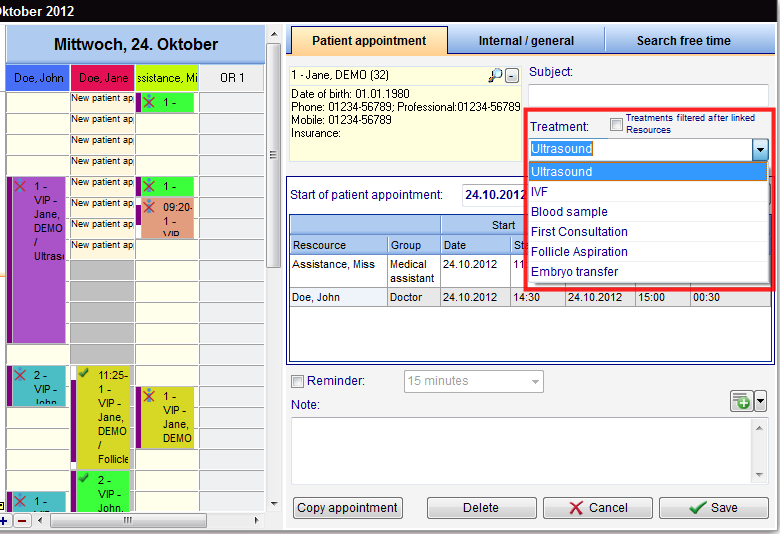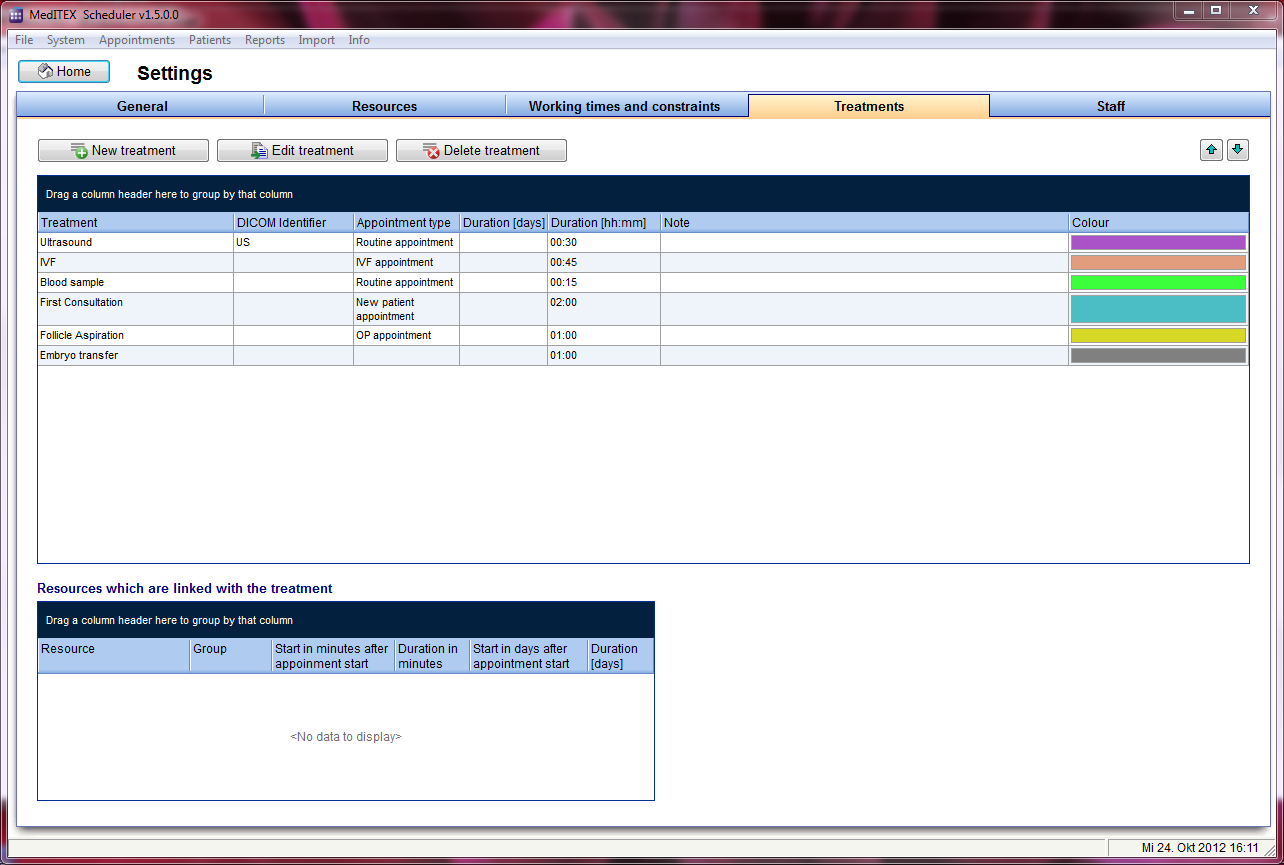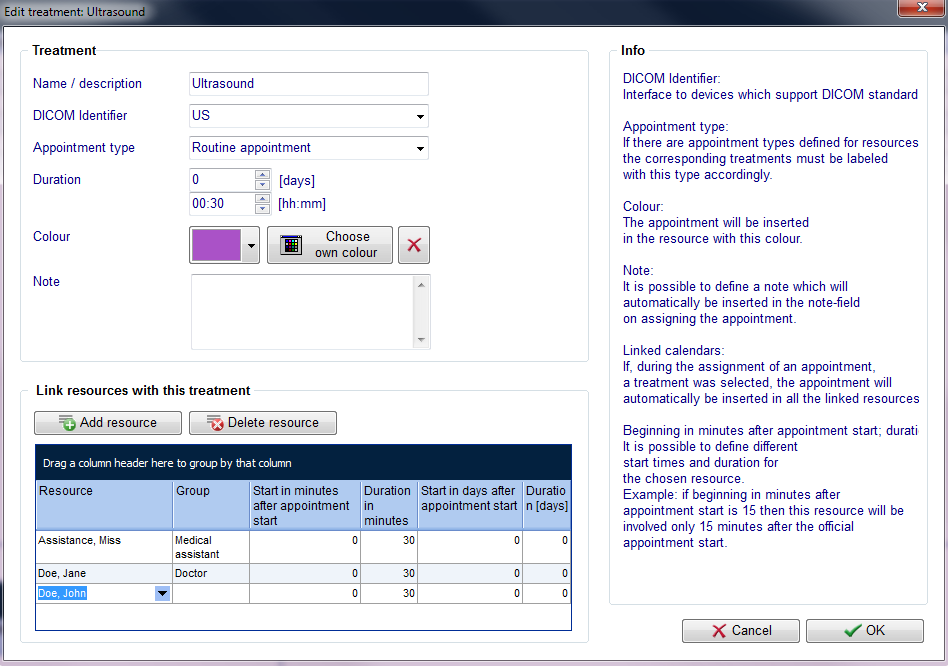MedITEX Scheduler configuration
From MedITEX - Wiki
The MedITEX Scheduler is an ideal tool to manage your time and clearly plan your appointments – for your team, your patients, your medical counselling and treatment. As an organisation, planning and coordination tool, the MedITEX Scheduler is exactly tailored to medical treatments and the progress of therapy.
 |
This page contains information on how to first configure MedITEX Scheduler.
| Each point can individually in the How to be gleaned. |
To edit the Settings of MedITEX Scheduler click on the menu item System -> Settings:
Contents |
General
Scheduler timescale
In tab sheet Scheduler you can adjust the general time unit of the calendar. This will affect all users of the program. However, each user may temporarily change this general time unit at any time, with a right click on the time scale.
| Back to top |
Open patient appointment
If the checkbox Open with double-click on a patient appointment the list of appointments of this patient is checked and you double click on an appointment in the scheduler, the appointment list with all appointments of this patient will be opened instead of the appointment editor. The advantage is that the user can get an overview about every appointment of that patient. The details of each appointment from the list can also be opened with a double click.
| Back to top |
Waiting time limit
The waiting limit defines the maximal allowed time for the patient to wait in the waiting room. If this limit is exceeded, the waiting time info (Since [hh:mm]) will turn red.
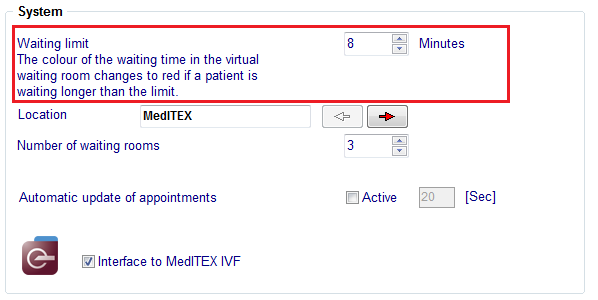 |
| Back to top |
Interface to MedITEX IVF
This setting enables you to open the selected patient’s data in MedITEX IVF, using the patient search mask, or the patient appointment (right click on appointment).
 |
|
| Back to top |
Resource administration
Groups
A group has to be assigned to each resource. There are three group types: Person, Room and Object. For example, the group Doctor belongs to the group type Person, and the group Device to the group type Object.
| You can create new groups and edit or delete existing ones in the area Group, to the left. |
Resources
Managing resources is the main goal of MedITEX Scheduler. A resource can be three distinct things: staff (doctors, nurses, receptionists), rooms and objects (X-ray, ultrasound).
Every resource is located in the table to the right.
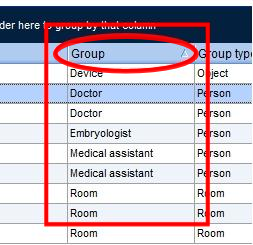 |
|
|
Hint: there are several important features available in every table in MedITEX Scheduler: With a click on the column header you can sort the table content by that column, ascending or descending. If you want to change the order of columns in a table, simply move the column header to the position where you want the column to be. To group the table content by the data of one column, move the column header into the table header (dark blue area on the top of a table). |
|
|
|
| By double-clicking a line - or by clicking on the button Edit resource - the editor window for the selected resource will appear |
| A view of the main scheduler window. On the left, the time scale is set to time interval of 15 minutes. On the right all resources are displayed side by side, in one day. Every user can reorder the resources individually. |
| Back to top |
Working times and restrictions (Resources settings)
In this area each resource can be adjusted in detail. General working times can be defined for the whole clinic, as well as special working times for each individual resource. Using appointment types it is possible to restrict some parts of the day to only accept certain appointment types, for each resource. It is also possible to restrict a resource to an allocated maximum number of appointments.
Appointment type
Time sections that allow only certain types of appointments can be defined for each resource. For example on Monday from 08:00 AM to 10:00 AM the doctor X performs only first interviews with new patients. By defining an appointment type First interview and assigning it to this resource and time, it will be possible to schedule only first interviews with doctor X on Monday morning. Or you may want to schedule on Thursday from 09:30 AM to 02:00 PM only appointments that take place in the operation room (OR)? In this case you can define an appointment type OR which you should assign to the involved resources and the specific time.
|
[[Image::AppointmentType2014.png|none|740px|thumb|left|link=http://wiki.meditex-software.com/images/:AppointmentType2014.png]] |
In the table to the left you can create and edit the appointment types. The first line in the table cannot be changed because it stands for all types of appointments (all kinds of appointments are possible).
| If the box Show text for the appointment types in resource row is checked, the allocated possible appointment types will be shown as text for each resource in the scheduler. It is also possible to provide these times with a special resource background colour. However, this colour is the same for all appointment types, so if you have several appointment types defined it is advisable to use only the text. | 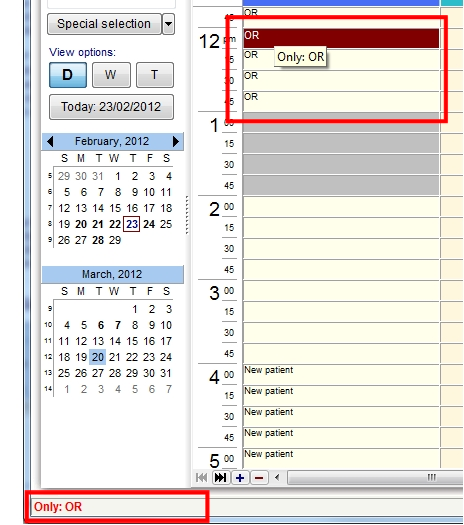 |
| Back to top |
Working times, assignment of an appointment type, and limitations
Over the right table you can define the working times for each resource. The first upper line of this table represents the general work times of your clinic. These will be automatically valid for all resources that have no specific work time defined. In the bottom table you can see the overview of each selected resource.
With double click on a resource or with the button Edit resource settings you can open the settings window of the selected resource.
With a click on the button New work time definition a new line will be inserted, in which you can define a new work model for the selected resource.
|
In the drop down list you can choose the appointment type(s) allowed for the selected work model – selected line. If you do not make a special selection (all boxes checked), all appointments will be displayed in the scheduler. In this way there will be no constraints on appointment type. |
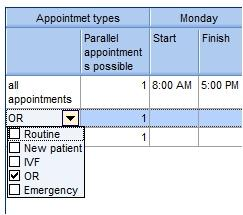 |
For each day you can define the time of start and end. If you like to define a break, like e. g. a lunch break, insert a further row (button New work time definition). In one row you apply the times UNTIL the break, in the row bellow you apply the times beginning FROM the break. If you have more rows for a day and there are overlapping times, the summary of the appointment types of the intersection are valid for the overlapping time.
Column Validity: If you don’t fill something out, the row with that working time definition will always be valid. But you can also fill out from or/and until. The scheduler will accordingly show the work times for that resource.
| Back to top |
Limitation of resources to a maximum number of assigned appointments
Resources can be limited to accept up to a maximum number of appointment starts per day. The limitation can be defined for each day or for whole week.
Example:
In a clinic there are four beds available. Every day one bed can be assigned only once, to one patient. A resource Beds has been defined. In order not to reserve more beds then beds available, a maximum number of starts of appointments for the resource Beds is limited to four.
If at the assignment of an appointment the maximum number is exceeded, a warning will be displayed.
| Back to top |
Treatments
Reason for an appointment
Treatments are suggested as reasons for appointments.
Example: An appointment is made with a patient who should come for an ultrasound. In the appointment details to the right, you should select Ultrasound from the list of possible treatments.
In order to edit a treatment you can double click on the desired treatment (line), or select the line and click the button Edit treatment. You can create a new treatment template with the button New treatment.
DICOM Identifier: The scheduler sends automatically the appointment to the working list of the ultrasound.
If you have defined appointment types in tab Working times and limitations, you should assign the corresponding appointment types to the treatments. In this way the warning system will be active while scheduling appointments. If a treatment has no appointment type assigned, this treatment will always be allowed and no warning will appear if an appointment including this treatment is scheduled at a time that is actually reserved for other appointment types.
| Back to top |
Treatments as appointment templates
For a treatment it is possible not only to define the duration and colour which the appointment will have if this treatment is selected, but also all involved resources.
In order to link a resource with the treatment, please click on button Add resource and select the resource in column 1. For each linked resource, it is possible to define a different start time and duration. If you select this treatment while scheduling an appointment, all linked resources with their corresponding times will automatically be assigned to the appointment.
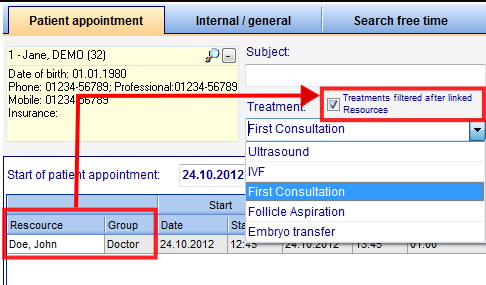 |
Example:
The treatment Follow-up examination is always executed by doctor John Doe and an assistant. We have the resource Doe, John and a resource Assistance, which in this case stands commonly for all assistances as for the person who is on duty at the moment. If an appointment Follow-up examination is assigned, it will appear in both resources. In order not to select each resource manually every time when assigning that appointment, we previously have linked these resources with the treatment in the settings. So if we choose this treatment for an appointment, the appointment will automatically be inserted in all linked resources.
In our example the follow-up examination is not only performed by Dr. John Doe, but also by Dr. Smith and the corresponding assistance. Therefore we apply a second treatment with the description follow-up examination and we add the resource Dr. Smith and Assistance.
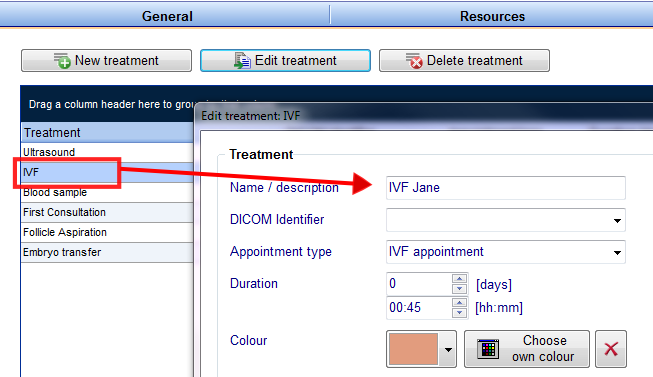 |
|
To assign a new appointment you usually double click in one of the resources that is involved in that kind of appointment. If you do so, this resource is already inserted in the appointment editor. The checkbox Treatments filtered after linked resource will be active, so you will have only treatments as choice, which are linked with the already selected resource, or those treatments that have no link to a resource at all. Hint: In order to distinguish in the overview more easily between treatments with the same description, you may place the initials or the abbreviation of the doctor whose resource is linked with the treatment. |
You may have a treatment with more resources that does not start at the same time for every linked resource. In the table with the linked resources in column Start in minutes after appointment start you can define for the resource, which is involved later in that appointment, how many minutes after the official appointment start, this appointment actually begins for that resource. Please consider that you may have to change the Duration in minutes too.
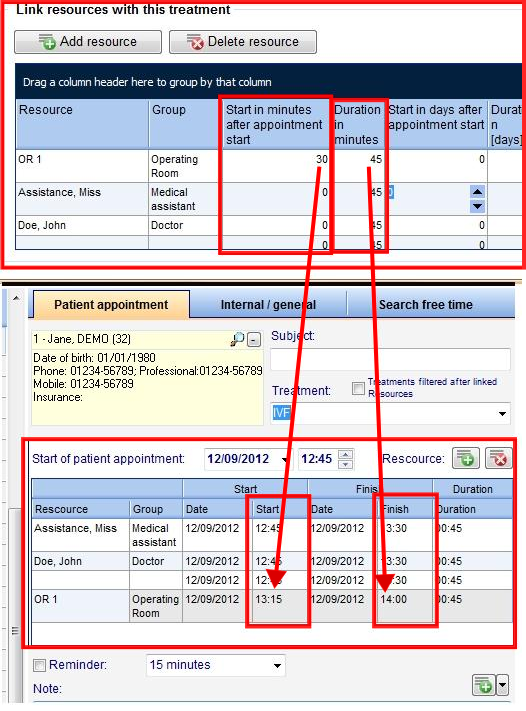 |
| Back to top |
Staff
The staff administration is only accessible for administrators in the new module. Click on the icon to go to MedITEX Administration manual.
 |
| MedITEX Administration |
| Back to the MedITEX Scheduler menu | Back to top |
